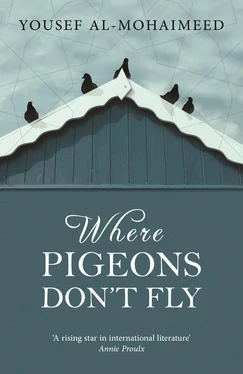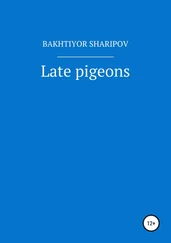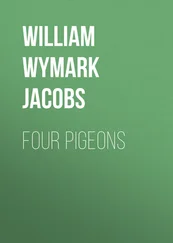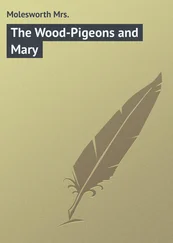By dawn the next day the paint had dried a little. With Saeed still sound asleep, Fahd opened a small tube of white paint and selected a one millimetre brush with a rounded, tapered point. Very delicately he swept up the white paint and in the centre of the canvas, right in the eye of its stormy blackness, began to draw exceptionally fine white lines, bunched together and bowed like swords. At first he imagined he was painting palm branches, bent and flying through the air, but after an hour spent hunched over the canvas in the quiet of the hateful city the outlines of a little feather started to appear, rocking in the heart of the painting; a bird’s feather falling from the lofty heavens to a sickeningly silent city. It seemed to be swaying between two skyscrapers, but it was bigger than both of them, the artist’s lens held close against it, rendering the vast towers no more than a distant backdrop to the scene.
Fahd painted with precision and perfection while in his mind an old memory unfurled of his Aunt Heila’s house in Buraida, of the wood fire in the coffee room where one cold winter’s night he had been playing with cousin Faisal, Hissa’s son, and Heila’s daughters, Shareefa and Lateefa.
The elder daughter, Shareefa, ordered them to all place their hands on the floor then suddenly lifted hers: ‘The car has flown!’
They kept their hands on the floor, alert and repeating warily and suspiciously,
‘It has not flown …’
Whoever got it wrong and raised their hands saying, ‘It’s flown,’ was out of the game, and so on until there was a winner.
‘My mother Noura’s flown.’
‘She hasn’t flown …’
‘The cat has flown.’
‘It hasn’t flown …’
‘The pigeon’s flown.’
‘It’s flown.’ and everybody raised their hands as one, while Fahd wavered for a moment before lifting his own.
‘Fahd, you’re out,’ screamed Shareefa.
‘No I’m not,’ he shouted angrily.
‘You didn’t lift your hands fast enough.’
‘Pigeons don’t fly!’ he said, swaying.
‘Pigeons fly, you idiot!’ said Lateefa, laughing.
‘Fine, Fahd gets a let-off,’ said Faisal sympathetically. ‘Let’s carry on.’
Sharifa thought for a bit then shouted, ‘The palm tree’s flown!’
‘It’s hasn’t flown …’
‘The feather duster’s flown!’
‘It hasn’t flown…’
‘The feather’s flown.’
‘It’s flown,’ said Fahd.
‘It hasn’t flown,’ shouted Faisal and Lateefa together.
The children began arguing in the still of a night broken only by the chirrup of cockroaches on the tall palms in the courtyard. Shareefa said that feathers don’t fly and Fahd objected loudly and angrily, saying that feathers flew.
‘No, no. Wrong,’ yelled Faisal and Lateefa. ‘Feathers don’t fly. It’s the pigeons that fly.’
Did pigeons fly? In his friend’s flat in Maseef, Fahd peered at the painting and thought back, spreading the wings of his memory and flying away to where the velvety pigeons in his uncle’s yard in Buraida scuttled on red legs, pursued by Yasser or Faisal. They dashed about flapping their clipped wings, tipping forward on to their breasts and righting themselves, then continuing their scampering and pecking at the tacky earth floor.
He remembered an old folk story from Buraida that he had heard as a child, about a young carpenter whose mother lived with him in a house with a yard where a large thorn tree rested against the top of the wall. The young carpenter sat in its shade all day making doors and windows, until his mother grew sick of his constant presence, which prevented her from meeting her lover and being alone with him. She wracked her brains for a way to make her son go to work outside the house. One day she summoned up her old woman’s cunning and came up to him, mumbling and mortified, to complain that the birds in the thorn tree were watching her naked and that the only way to get rid of these peeping fowl was to cut down the tree. She got her wish and her son lost his cool shade. He left to work beneath a distant tree and she, free of his constant company at home, could have her lover visit whenever she wanted.
— 27 —
AFTER PASSING GHABEERA ON Manfouha’s main road, Yasser stopped the car outside a dilapidated old building below which were shops for pots and pans and a cheap goods emporia ( Everything for 2 Riyals ). He adjusted his spectacles in order to dial the Egyptian sheikh’s number.
‘Peace be upon you, Sheikh Mohammed.’
In stately tones Sheikh Mohammed Abdel Muati informed him that he would be down in a few minutes. Yasser stared out at the road ahead: the female street sellers, the Egyptian women in their hijabs out shopping on the high street, two Egyptian youths waiting outside a stall selling sugar cane juice, municipal buses parked by the roadside, Bangladeshi labourers carrying buckets full of water and car-washing gear on their shoulders, Pakistanis in Punjabi dress driving their motorcycles next to the kerb, Indians, Afghans and children queuing outside the Temees Afghan bakery on the other side of the street, an old beggarwoman, black, hunchbacked and tapping on his car window. Yasser pointed his thumb to the sky and his lips moved: ‘God is generous.’
There was a tap at his other window and he swung round in irritation only to find the Egyptian sheikh smiling at him. His face was round and pink, rimmed by a reddish beard, a dark prayer-bruise on his forehead. He wore a pristine and well-pressed white ghatra , slightly raised to reveal a sieve-like string prayer cap, while his collar hung open where he had forgotten to button up his thaub . This he now did as the car left Old Manfouha for Ulaya and ‘the Jordanian woman’s place’ as Yasser called the house of his father’s third wife.
The Egyptian was talking about corruption in Manfouha and the Bangladeshis who traded in alcohol, prostitution and other banned commodities.
‘God suffices me and is my best provider!’ he exclaimed, combing his fingers through his beard while Yasser expressed his agreement. Then he changed the subject and asked if Abu Ayoub was well. Almost playfully he said, ‘Wouldn’t it be better if we found him a jolly young Egyptian girl, Sheikh Yasser? A real salt of the earth type, instead of the hassle and problems of a sick woman who needs her kids, not a husband.’
Yasser nodded, ‘Just as you say, sheikh.’
At home, Lulua was in the dining room with the green bolsters, changing the foam mattress for her sick mother, while Soha walked slowly and listlessly to the kitchen and from there to the bedroom, where she put on a long-sleeved shirt and a black headscarf. Then she wrapped herself in a blue, spotted prayer robe and faced towards the qibla , raising hands tattooed with henna and imploring her Lord to treat her kindly or take her to the side of Abu Fahd, who had left one morning never to return. Whenever she thought of Suleiman and their outings in the Riyadh night a tear sprang to her eye and a sob grumbled in her little chest.
The steel gate at the bottom of the stairs creaked and the sound of the Abu Ayoub’s coughing and incantations grew louder as he mounted the stairs, a plastic gallon jug of zamzam water in his hand, which he set down by the entrance to the kitchen from which wafted the smell of fried eggs.
‘This zamzam water’s been blessed,’ he said to Lulua.
She poured a glass and handed it to her mother, who staggered towards the dining room. Minutes later the doorbell rang and Sheikh Mohammed Abdel Muati entered accompanied by Yasser. The pair of them waited in the men’s majlis for the five minutes Soha needed to dress herself in her prayer robe, over which Abu Ayoub placed her black abaya .
Читать дальше












